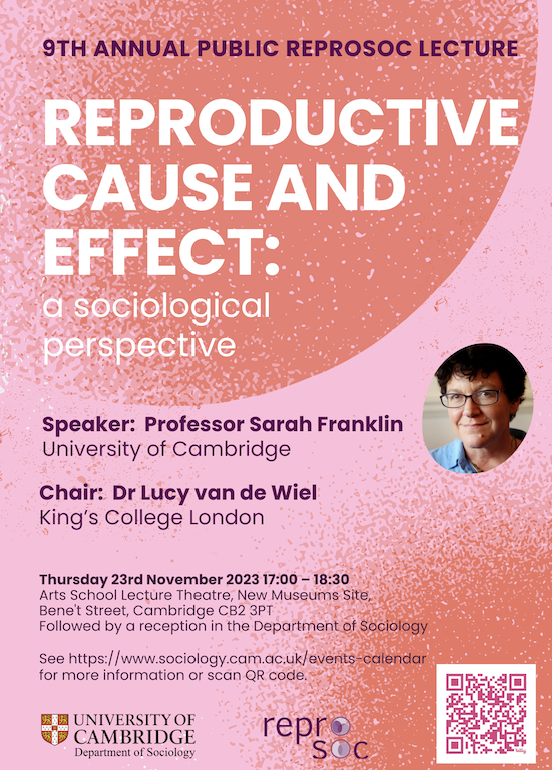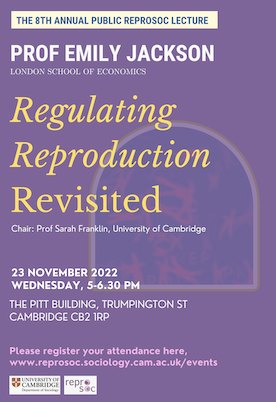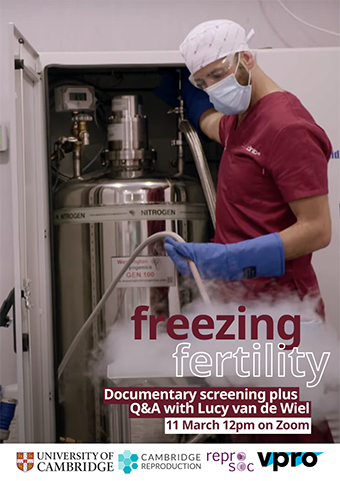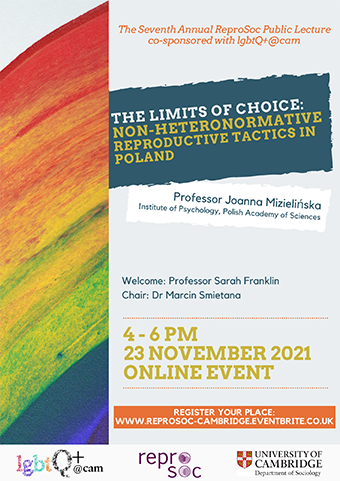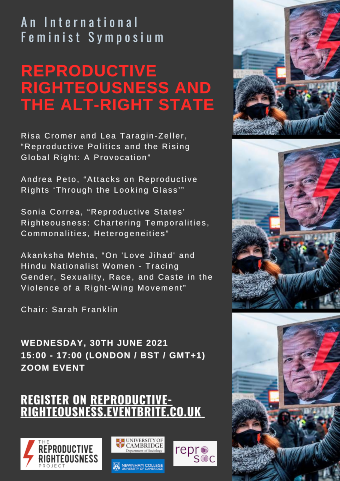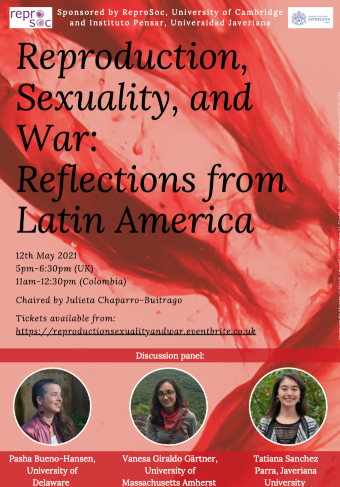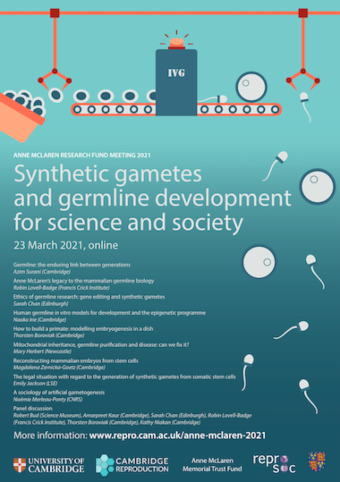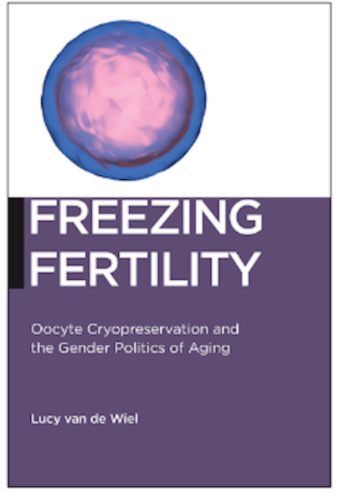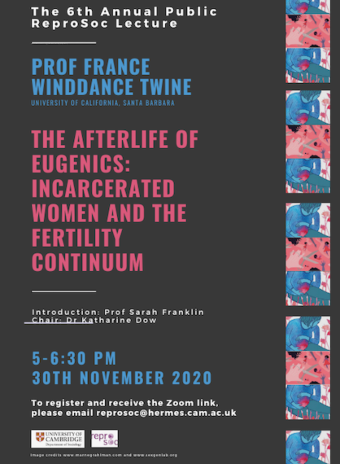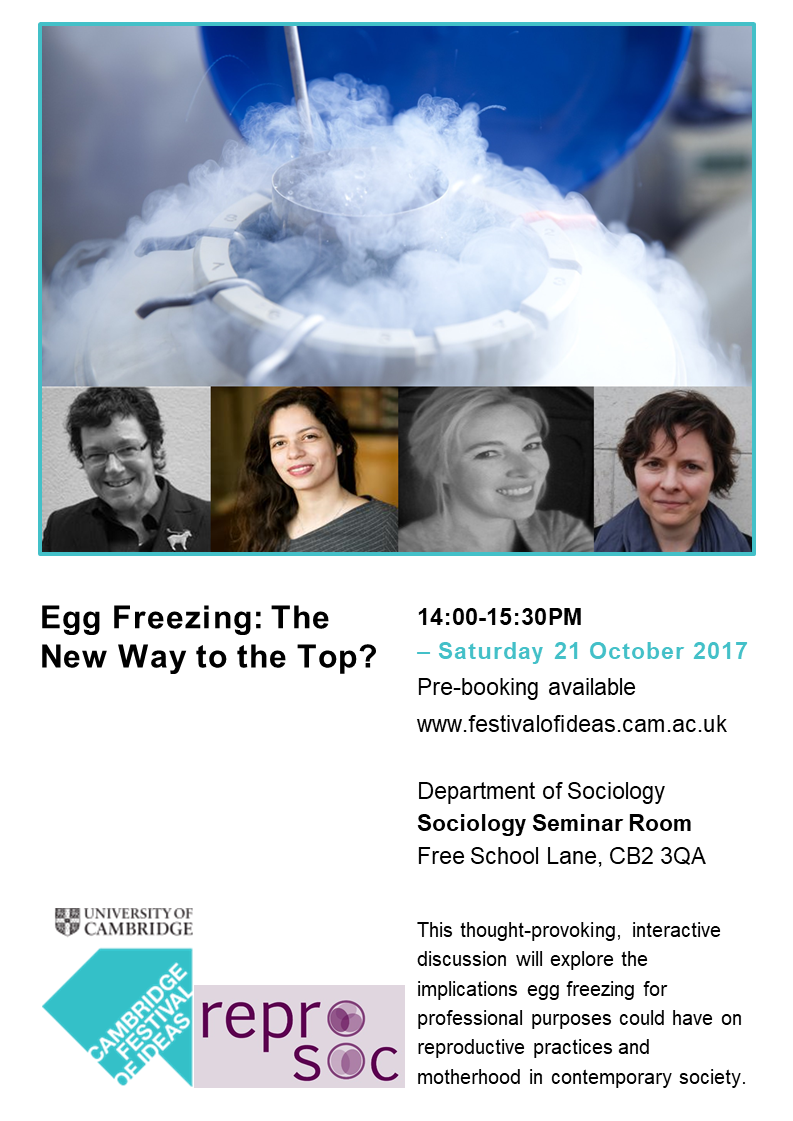ReproSoc hosts various events throughout the year from public lectures to conferences and workshops. Please find details of our past events below, with links to video and audio podcasts where available.
|
9th Annual Public ReproSoc Lecture REPRODUCTIVE CAUSE AND EFFECT: A SOCIOLOGICAL PERSPECTIVE Thursday 23rd November 2023, 17:00 – 18:30 | Arts Lecture Theatre, New Museums Site Speaker: Professor Sarah Franklin In anticipation of its transition to a virtual network, this lecture looks back at the work of the Reproductive Sociology Research group over the past decade from the point of view of how we understand reproductive cause and effect. Initially the lecture considers some of the intriguing parallels in how dominant models of reproductive causality have been reversed in both the social and the life sciences over the past two decades. In the second half the lecture looks at specific sociological examples of cause and effect ‘reversals’, many of them taken from the work of ReproSoc researchers. The lecture concludes by arguing that sociology offers us a specific vantage point on reproductive causality, and that, as a system of relations, reproductivity also has lessons for how we understand causality in sociological terms. As ever, the lecture will feature sheep, poetry, bad puns, made-up repro words and scenes of collective cake consumption. Please register here
No upcoming events after that.
|
|||
|
|
|
Please keep an eye on this page, sign up to our newsletter, or follow us on social media to keep up to date with any announcements.
 |
|
|
|||
|
|
The 8th Annual Public ReproSoc LectureRegulating Reproduction RevisitedProf Emily Jackson, London School of Economics 23 November 2022 | 5-6.30pm | The Pitt BuildingChair: Prof Sarah Franklin, University of CambridgeIn this lecture, Prof Emily Jackson will revisit some of the themes of her 2001 book Regulating Reproduction: Law, Technology and Autonomy, in which she argued that women’s reproductive autonomy should be better protected by the law. Have things improved over the last 21 years, or has there been one step forwards and two steps backwards? The event will be followed by a reception and a book launch of recent publications by ReproSoc members.
Freezing Fertility documentary screening and live Q&A with Lucy van de Wiel11th March 2022 | 12pm | ZoomJoin us for a screening of the VPRO documentary Freezing Fertility followed by a live Q&A with Lucy van de Wiel. In this episode, VPRO Backlight dives into the world of malleable fertility. Talks are held with fertility entrepreneurs, embryologists, IVF specialists and researchers. One saw fertility as a gap in the market and set up Spain's first egg bank. The other is concerned about the commercialization of fertility and is working on UK's first not-for-profit 'fertility service'. They have one thing in common: all are concerned with catching up with the human biological clock. Lucy van de Wiel, a Changing (In)Fertilities Work Package Coordinator and former ReproSoc Research Associate, is featured in the documentary. Author of the book Freezing Fertility, she investigates how new technologies that promise to turn back our biological clocks are changing how we think about fertility. According to her, technologies such as egg freezing give the impression that people have more control over their fertility. Fertility is therefore experienced differently: you have to work on it earlier, but it also plays a role for a longer period of time. Join us for the screening followed by a live Q&A with Lucy van de Wiel. This event is organised in collaboration with Cambridge Reproduction. |
||
Watch OnlineThe 7th Annual ReproSoc Public LectureThe Limits of Choice: Non-Heteronormative Reproductive Tactics in PolandProfessor Joanna Mizielińska, Institute of Psychology, Polish Academy of Sciences 23rd November 2021 | 4pm | ZoomWhile in the West, there is an increasing tendency to discuss reproductive normativity among non-heterosexual people, which is related to the legal recognition and protection of their parentage as well as the availability of choices, in Poland their possibilities of becoming parents are very limited. Pronatalist state policies regulating access to assisted reproductive techniques are selective, heteronormative and exclusive. It is enough to mention that the so-called 2015 ‘In Vitro’ Act establishes the possibility of using the services of infertility treatment clinics in Poland only for heterosexual couples who are married or cohabit. Therefore, the law restricts same-sex couples who want to raise a child in their ways of implementing reproductive plans. When they are raising a child, they struggle with non-recognition of the nature of their own family, especially the bonds between the child and the co-parent remains completely unprotected. During the lecture, I aim to show how non-heterosexual people in Poland, despite these restrictions, become parents. What reproductive tactics do they choose? What legal loopholes are they exploiting? What factors influence their choice (gender, material status, class affiliation, age)? I will refer to the results of the research project "Families of Choice in Poland", which I directed. |
|||
|
|
|||
|
|
|
Watch onlineReproductive Righteousness and the Alt-Right State: An International Feminist Symposium30th June 3-5pm (London / GMT+1 / BST) | Zoom
The Reproductive Righteousness Project is a new initiative launched by ReproSoc to explore the ways in which families, fertility and reproduction have become increasingly important discursive devices through which right wing populist leaders invoke the threat of national, social and cultural decline. From Trump’s “America first” to Kaczyński’s “there is only one Poland,” expressions of ethno-nationalism, right-wing populism, and authoritarianism are increasingly central to right-wing authoritarian regimes. This project brings together feminist scholars with wide-ranging expertise to collaboratively theorize expressions of what we call “reproductive righteousness.”
More Information about the event |
|
|
|
|||
Watch onlinePanel discussion "Reproduction, Sexuality, and War: Reflections from Latin America”12th May 2021 | 5-6.30pm (BST) | ZoomIn this panel discussion reproduction and sexuality was at the center to understand how they have animated recent political debates and transitions (Briggs, 2017) in Latin America. Looking at the pre-post conflict state (Theidon 2007) in Colombia and Peru, the participants in this round table reflected on the conflicting implications of reproduction and sexuality in transitional justice, the functioning of the law, and violence.
This event is sponsored by ReproSoc (University of Cambridge) and Instituto Pensar (Universidad Javeriana).
More information here www.reproductionsexualityandwar.eventbrite.co.uk
|
|||
|
|
|||
Watch OnlineAnne McLaren Research Fund MeetingSynthetic gametes and germline development for science and society23rd March 2021 | 10am-5pm (GMT) | ZoomThe second Anne McLaren Symposium followed a successful meeting held last December at the Wellcome Trust and adopted the same format in that each 15-minute talk was followed by 15 minutes of general discussion. The theme for this second meeting again emphasised translational bioscience in its widest sense, this time with a focus on synthetic gametes, and once again drawing on a wide range of disciplinary perspectives. Speakers included: Thorsten Boroviak (Cambridge), Robert Bud (Science Museum), Sarah Chan (Edinburgh), Mary Herbert (Newcastle), Naoko Irie (Cambridge), Emily Jackson (LSE), Amarpreet Kaur (Cambridge), Robin Lovell-Badge (Francis Crick Institute), Noémie Merleau-Ponty (CNRS/Cambridge), Azim Surani (Cambridge) and Magdalena Zernicka-Goetz (Cambridge) For more information about the programme, please see the conference website: https://www.repro.cam.ac.uk/anne-mclaren-2021/programme We are very grateful to the conference sponsors and supporters:
|
|||
|
|
|||
Book Launch"Freezing Fertility: Oocyte Cryopreservation and the Gender Politics of Aging"Dr Lucy van de Wiel, ReproSoc, University of CambridgeDecember 2020 | 5pm | ZoomWhile the pandemic prevents a party in person, we will celebrate the publication of Freezing Fertility with a festive online event. Lucy and her guests will take you on a tour of the book and its story of the egg's journey from the ovary, to the freezer, to the womb, and across the world. |
|||
|
|
|||
The 6th Annual ReproSoc Public Lecture Watch onlineThe Afterlife of Eugenics: Incarcerated Women and the Fertility ContinuumProf France Winddance Twine, UC Santa Barbara30th November 2020 | 5pm | ZoomIn 1909 California became the third state to pass eugenics laws that sanctioned involuntary sterilization of institutionalized individuals deemed ‘unfit to reproduce’. These laws remained on the books until their repeal in 1979. In the summer of 2013, the Center for Investigative Reporting published an article alleging that female inmates in California state prisons had been sterilized without their consent and without procedural accountability. This exposé prompted a state investigation which confirmed that 144 women had been sterilized in California state prisons between 2005 and 2006 and 2012- 2013. This talk explores how mass incarceration, structural racism, gender inequality and neo-liberalism combine to constrain the reproductive agency of incarcerated women and violate their bodily integrity. By situating recent investigations of unnecessary hysterectomies in US prisons within the larger history of eugenics in the United States, this lecture brings Twine’s concept of the ‘fertility continuum’ into dialogue with Dorothy Roberts concept of ‘reproductive liberty’. The outsourcing of prison management to private corporations has produced a profit-driven and under-regulated carceral structure that is responsible for the delivery of reproductive health care and management of fertility for increasing numbers of women – with especially devastating consequences for impoverished, Black, Native American and Spanish-speaking citizens and immigrants from the Caribbean and Latin America. In turn these violations significantly widen the analysis of what Dana Ain Davis calls ‘Reproductive (In)Justice’. |
|||
|
|
|||
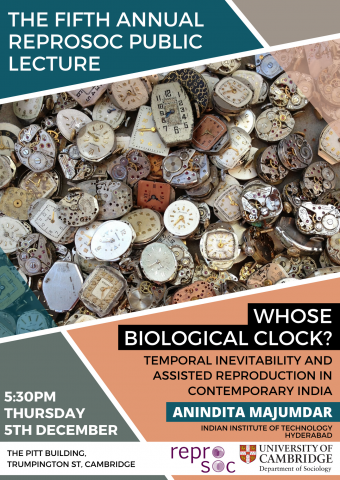 |
The Fifth Annual ReproSoc Lecture Watch onlineWhose Biological Clock? Temporal Inevitability and Assisted Reproduction in Contemporary IndiaAnindita Majumdar5th December 2019 | 5:30pm | The Pitt Building, CambridgeThe relation between time and ageing defines the increasingly influential concept of the biological clock. This conceptualization is especially potent in relation to the reproductive body, and its expected, inevitable decline. Imagined as a ‘curse’, the ticking clock operates both as a metaphor and a tour de force in assisted reproduction in India. In this endeavor, I am interested in seeking out the meanings of age and ageing as they come to be understood within reproduction in India. The focus is particularly on assisted conception, and the use of assisted reproductive technologies (ART) such as in-vitro fertilization to engage with the issue of reproductive temporality. What forms of socio-medical imaginings influence this form of temporality? Can time and age be seen beyond the life cycle to understand how particular technologies are used to ‘reconfigure’ it? The linkages between ageing and infertility-fertility become more marked in the infertility clinic where the diagnostic protocols and treatment offer desired routes to parenthood according to the demands of social and moral judgements. In addition, rural-urban differences, gendered expectations of familial roles and rules, and lived environments and lifestyles have a huge impact on the use and dissemination of assisted reproductive technologies in India. Thus, in the city of Hyderabad in South India, where I did my fieldwork, clinicians encourage women to choose parenthood over professional goals in order to subvert the inevitable biological clock. This means that the lifestyle associated with working in the highly competitive and demanding information technology industry, to which many of respondents belonged, came under harsh scrutiny. On the other hand, rising cases of infertility in rural North India led IVF specialists and patients to engage in the subversion of ideas regarding aged parenthood and expected social roles linked to the life cycle. Yet, infertility and the associated use of assisted reproductive technologies began to resemble a road to inevitability. In India where pronatalism co-exists with the overwhelming pressure towards population control, what meaning does the desire for children born through assisted reproduction carry? It is to these dilemmas that I turn to in conceptualizing the curse of the biological clock in its temporal inevitability. |
||
|
|
|||
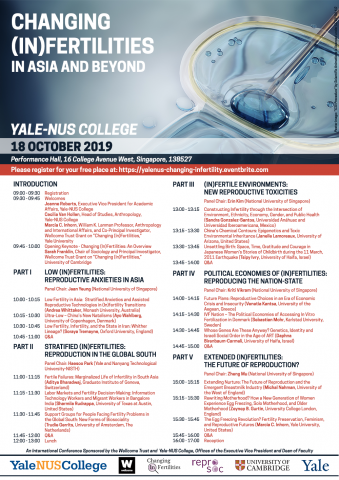 |
Changing (In)Fertilities: in Asia and Beyond18th October 2019 | Performance Hall, 16 College Avenue West, Yale-NUS College, Singapore, 138527
Changing (In)Fertilities in Asia and Beyond is an interdisciplinary conference that attempts to transform the wider conversation about fertility and infertility – and about reproduction more generally in the post-assisted reproductive technology (ART) era – in Asia and around the world. The conference is a collaboration between Yale-NUS College, Yale University, and the University of Cambridge, and involves scholars from NUS, NTU, and many other global universities. The conference is free and open to the public - RSVP today to reserve your spot! |
||
|
|
|||
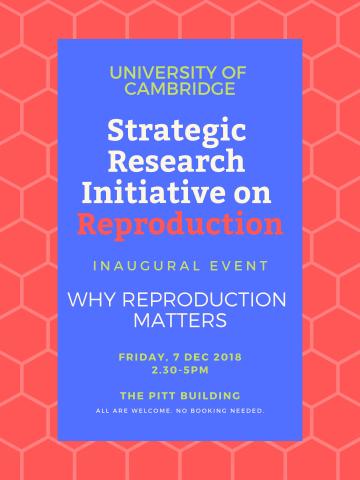 |
Strategic Research Initiative on Reproduction Launch EventWhy Reproduction Matters7th December 2018 | 2:30–5:00pm | The Pitt BuildingYou are warmly invited to attend the event to launch the exciting Strategic Research Initiative on Reproduction. Funded for three years, this University-wide network aims to encourage interactions among the many Cambridge researchers at different career levels with interests in reproduction, from clinical medicine and biology to the arts, humanities and social sciences. It seeks to build research capacity and partnerships. The event will take place in the Pitt Building on Trumpington St at 2:30–5:00 pm on Friday 7 December before the launch of the book Reproduction: Antiquity to the Present Day in nearby Pembroke College.
There’ll be a chance to watch videos on why reproduction matters, chat over tea, hear short interdisciplinary talks about reproduction, and find out about opportunities under the SRI. All are welcome and there is no need to book. |
||
|
|
|||
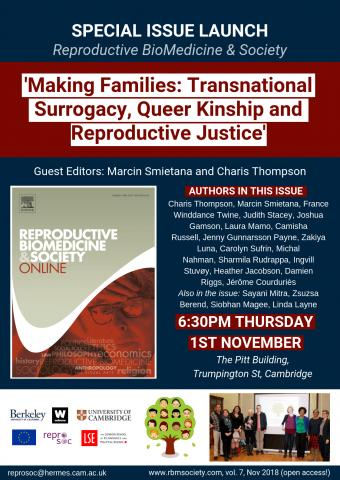 |
Launch Event: Special Issue of Reproductive BioMedicine & Society‘Making Families: Transnational Surrogacy,
|
||
|
|
|||
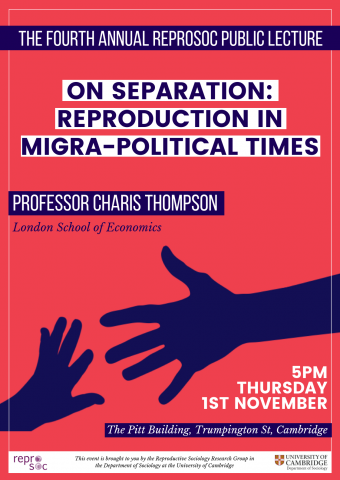 |
The Fourth Annual ReproSoc Lecture Watch videoOn Separation: Reproduction in Migra-Political TimesProfessor Charis Thompson1st November 2018 | 5:00pm | The Pitt Building, CambridgeIn this talk, Charis Thompson presents her recent work advocating the addition of a migrapolitical lens to biopolitical and necropolitical ways of understanding the differential valuing of contemporary human life. With reference to her own concept of selective pronatalism, and in conversation with other bio- and necropolitical work on stratified reproduction, reproductive justice, selecting societies, and queer reproductions, Thompson argues for the importance of considering migration as foundational, with birth and death, to a new sociology of reproduction. To illustrate, she does a close reading of the concept of ‘separation’ as a kinship and family term, and argues that its current political salience in regard to migration can help us understand and potentially influence the role that migrapolitics play more generally in kinship and reproduction.
|
||
|
|
|||
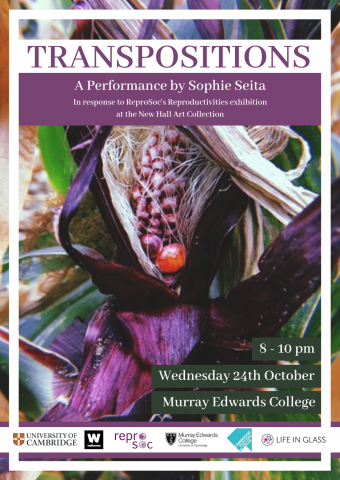 |
TranspositionsA Performance by Sophie Seita in response to ReproSoc's Reproductivities exhibition at the New Hall Art Collection24th October 2018 | 8 - 10pm | Murray Edwards CollegePart of the Cambridge Festival of Ideas In honour of the work of Nobel-prize winning plant scientist Barbara McClintock, we celebrate her key concept of ‘Transpositions’ in an evening of performance, ritual, and artistic exchanges. Responding to the Reproductivities exhibition, performance artist Sophie Seita's commissioned piece Transpositions will reflect on the concept and choreography of transposition, queer kinship, corn as a queer plant, ritual, the ritornello, and the cross-pollinating possibilities of flowery metaphors and of planting queer objects. The performance will include spoken text, choreographed movement, interaction with objects, as well as recorded and live sound. Alongside Seita’s performance, we invite the audience to engage with scientific, artisanal and artistic mediations of maize – McClintock’s plant of choice – through the Reproductivities exhibition on display throughout the College. The performance will include an immersive, participatory component and is followed by a Q&A with the artists and curators. For more information please visit the Life in Glass website. Please register your place on Eventbrite. |
||
|
|
|||
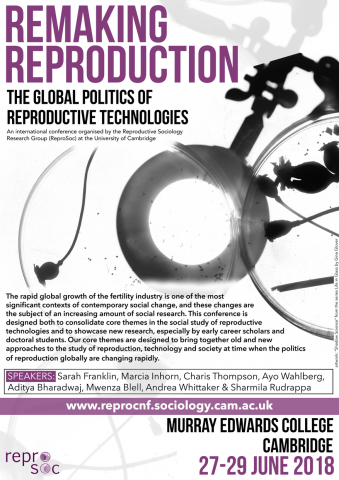 |
Remaking Reproduction: The Global Politics of Reproductive TechnologiesAn international conference organised by the Reproductive Sociology Research Group (ReproSoc) at the University of Cambridge27-29th June 2018 | Murray Edwards College, Cambridge
The rapid global growth of the fertility industry is one of the most significant contexts of contemporary social change, and these changes are the subject of an increasing amount of social research. This conference is designed both to consolidate core themes in the social study of reproductive technologies and to showcase new research, especially by early career scholars and doctoral students. Our core themes are designed to bring together old and new approaches to the study of reproduction, technology and society at a time when the politics of reproduction globally are changing rapidly. Throughout the conference, we will be running concurrent panels where you will have a chance to respond to the conference themes and share your research on reproduction. The paper panels will be divided across six themed streams: Race, Nation and Reproduction; Reproductive Bodies and Cultures; Changing In/Fertilities; Making New Biologies; Reproductive Futures; and Mediated Reproduction. Please consider which stream(s) your paper might fit best with when submitting your abstract.
|
||
|
|
|||
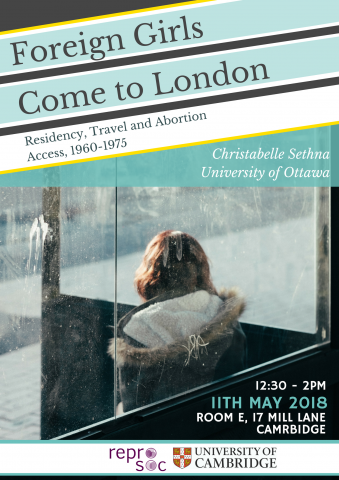 |
"Foreign Girls Come to London": Residency, Traveland Abortion Access, 1960-1975Christabelle Sethna11th May 2018 | 12:30 - 2pm | Room E, 17 Mill Lane, CambridgeTravel is one of the central barriers to abortion access; the further a woman has to travel for an abortion, the less likely she is to obtain one and the more likely she is to be young and underprivileged. Yet, this kind of travel persists. Often conducted over long range and across domestic and international borders, “abortion tourism” remains a commonplace transnational phenomenon. Today, the case of Irish women who travel to the UK to access legal abortion services is familiar to many. However, travel for abortion services has a much longer history. This presentation is based on Christabelle Sethna’s research, funded by the Social Sciences and Humanities Research Council of Canada, which tracks women’s domestic and international travel for abortion services. It focuses on the complex transnational geopolitical and biopolitical issues raised once women began to travel to Britian for abortion services after the passage of the 1967 Abortion Act, a piece of legislation that did not include residency qualifications. The presentation explores the reasons why non-national women travelled to Britain, and to London in particular, for legal abortions in the 1960s and 1970s and discusses the transgressive relationships that exist between the crossing of sexual, legal and geographical borders. The presentation also opens up for timely consideration the fraught meanings of residency and travel across borders in the UK. Dr. Christabelle Sethna is Professor in the Institute of Feminist and Gender Studies, University of Ottawa. She is a historian who researches the history of sex education, contraception and abortion as well as animal representations. Her latest book, co-authored with Steve Hewitt, is Just Watch Us: RCMP Surveillance of the Women’s Liberation Movement in Cold War Canada (McGill-Queen’s University Press 2018). |
||
|
|
|||
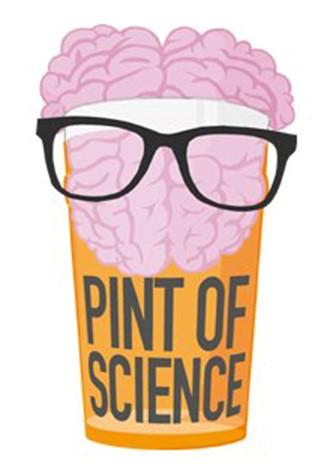 |
Dish Life at the Pint of Science UCL Launch Event5th April 2018 | 7:30-9:30pmFarr's School of Dancing 17-19 Dalston Lane, London E8 3DF
The Pint of Science festival is back and UCL is ready to start! Join us for our special launch event! Amazing science from our event managers, anticipations about the festival in May and a movie! Still not enough? The event is totally free and you will get the chance to win amazing Pint of Science goodies! Grab your ticket now!
What happens when you mix stem cell science, sociology and filmmaking? Dish Life is an award-winning multidisciplinary film born at Cambridge University from the collaboration of a stem cell scientist, a sociologist and a filmmaker. At the core of the short film and their collaboration, are some intriguing questions: how can we show the public the daily labour of nurture and care for stem cells that is so critical for this research field? How can we show how science is done and how scientists feel about their work? After the screening, the producers will talk about making the film and what it means to work across disciplines and genres in science communication. |
||
|
|
|||
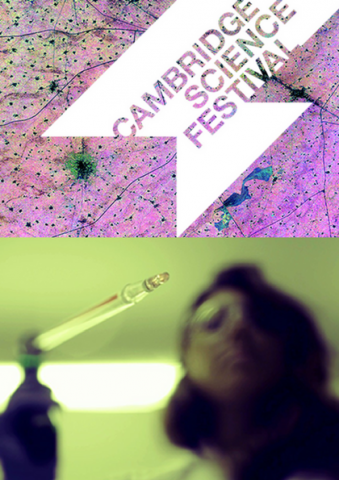 |
Life in a DishA Cambridge Science Festival Event22nd March 2018 | 6-8pm | St Barnabas Church, Mill Road, CB1 2BD
How does society connect to and manipulate living matter and how can we explore this through film and virtual games? |
||
|
|
|||
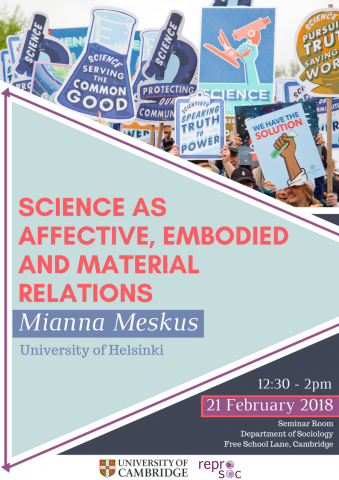 |
|
|
Science as Affective, Embodied and Material RelationsMianna Meskus21st February 2018 | 12:30 - 2pmSeminar Room, Department of Sociology, Free School Lane, Cambridge
This talk addresses “scientific craftwork” in the use of human biological material for the benefit of biomedicine, innovation and patients’ health. A revolutionary cellular reprogramming technique has made it possible to turn human skin and blood cells into pluripotent stem cells, thus providing an unprecedented opportunity to study the pathophysiology of diseases, understand human developmental biology, and generate new therapies. Using the so called iPS cell technology as a point of entry, I examine how the foundations of biomedical knowledge production lie in embodied skill and affective engagement with cellular research material. Combining relational materialism and pragmatist philosophy of experience, I develop the idea of an instrumentality-care continuum as a core dynamic of biomedical craft, involving both researchers and patients as tissue donors. This continuum opens up a novel perspective to the commercialization and industrial-scale appropriation of human biology, and thereby to the future of ethical biomedical research. |
|
|
|
|
|
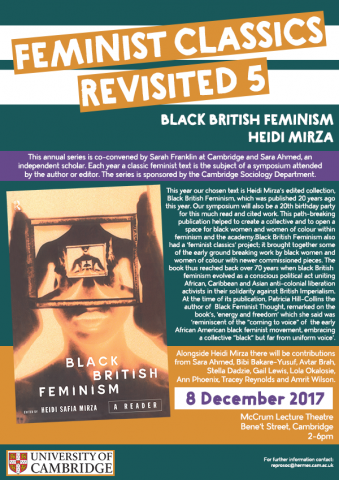 |
|
|
Feminist Classics Revisited 5Black British Feminism - Heidi Mirza8th December 2017 | 2 - 6pm | McCrum Lecture Theatre, Bene't St, CambridgeThis year our chosen text is Heidi Mirza’s edited collection, Black British Feminism, which was published 20 years ago this year. Our symposium will also be a 20th birthday party for this much read and cited work. At 20 years old, Black British Feminism is the youngest of the feminist books we have discussed thus far. We have chosen it because as a collection it helped to create a collective; to create a space for black women and women of colour within feminism and the academy. Black British Feminism also had a ‘feminist classics’ project; it brought together some of the early ground breaking work by black women and women of colour with newer commissioned pieces. The book thus reached back over 70 years when black British feminism evolved as a conscious political act uniting African and Indian anti-colonial liberation activists in their solidarity against British Imperialism. At the time of its publication, Patricia Hill-Collins the author of Black Feminist Thought, remarked on the book's, ‘energy and freedom’ which she said was ‘reminiscent of the “coming to voice” of the early African American black feminist movement, embracing a collective “black” but far from uniform voice’.
Alongside Heidi Mirza there will be contributions from Sara Ahmed, Bibi Bakare-Yusuf, Avtar Brah, Stella Dadzie, Gail Lewis, Lola Okolosie, Lola Olufemi, Ann Phoenix, Tracey Reynolds and Amrit Wilson. |
|
|
|||
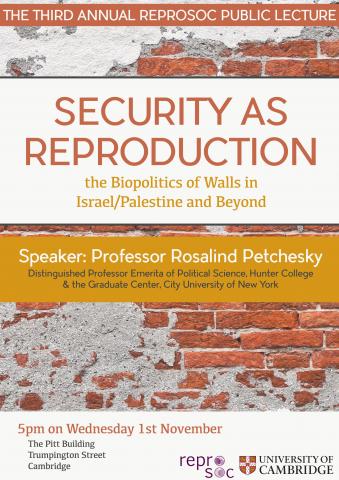 |
|
The Third Annual ReproSoc Public LectureSecurity as Reproduction: the Biopolitics of Walls in Israel/Palestine and BeyondProfessor Rosalind Petchesky1st November 2017 | 5:00pm | The Pitt Building, CambridgeIt was with great enthusiasm and excitement that ReproSoc welcomed Rosalind Petchesky to Cambridge this autumn to deliver a lecture on a new definition of reproductive politics as securitization. Addressing issues of walls, people, movements and containment as 'reproductive politics' in the broadest sense, Ros characteristically mapped out an ambitious new model of how we might theorise containment as reproductive control, and resistance as a reproductive insurrection. Her lecture was followed by a moving half day workshop with close colleagues Sonia Correa and Marge Berer that re-examined the long histories of reproductive rights activism and writing. |
|
|
|
|
|
|
Egg Freezing: The New Way to the Top?Cambridge Festival of Ideas21st October | 2:00 - 3:30 | Department of Sociology, Seminar Room, Free School Lane , CB2 3QAEgg freezing has previously been used to preserve fertility, mainly for medical reasons. However, increasingly, egg freezing is becoming of interest to women for social and professional reasons. Companies such as Google, Facebook and Apple have employee benefits to cover the cost of IVF and egg freezing in an effort to recruit and retain talented women in their workforces. Speakers will discuss the implications egg freezing is projected to have for career progression, reproductive practices, and motherhood, if the technology is implemented more widely. The discussion will be Chaired by Prof. Sarah Franklin, the Director of the ReproSoc Study Group. Confirmed speakers so far include Prof. Wendy Sigle from LSE and Dr Lucy van de Wiel from the University of Cambridge. |
|||
|
|
|||
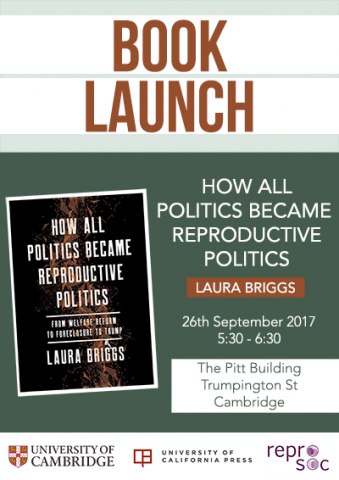 |
|
How All Politics Became Reproductive Politics Book LaunchFrom Welfare Reform to Foreclosure to Trumpby Laura Briggs26th September 2017 | 5:30 - 6:30 | The Pitt Building, Trumpington St, Cambridge
Today all politics are reproductive politics, argues esteemed feminist critic Laura Briggs. From longer work hours to the election of Donald Trump, our current political crisis is above all about reproduction. Households are where we face our economic realities as social safety nets get cut and wages decline. Briggs brilliantly outlines how politicians’ racist accounts of reproduction—stories of Black “welfare queens” and Latina “breeding machines"—were the leading wedge in the government and business disinvestment in families. With decreasing wages, rising McJobs, and no resources for family care, our households have grown ever more precarious over the past forty years in sharply race-and class-stratified ways. This crisis, argues Briggs, fuels all others—from immigration to gay marriage, anti-feminism to the rise of the Tea Party. |
|
|
|
|
|
|
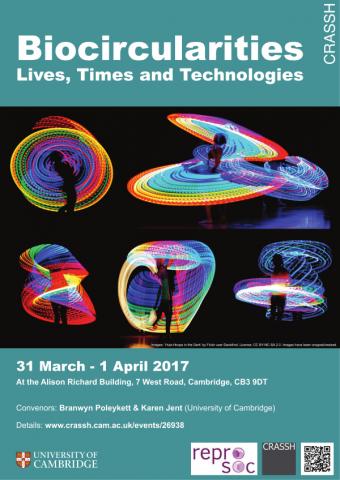 |
|
BiocircularitiesLives, Times and Technologies31st March - 1st April 2017 | Alison Richard BuildingConvened by Branwyn Poleykett and Karen Jent The Biocircularities meeting explores the diverse ways in which technoscientific innovations in epigenetics, bio-banking and regenerative medicine challenge and redefine traditional life course models. Questioning the methodological assumption that lives are ‘lived forward’ from birth to death in the linearity of successive steps, speakers foreground the circularities of life and the loops of bodily experience. The registration is now open. Professor Ayo Wahlberg (University of Copenhagen) will give the public keynote address on 'Exposed biology and the reproduction problem' on 31 March 2017 at 5pm, Alison Richards Building, 7 West Road, Cambridge, CB3 9DT. There are postgraduate bursaries for MPhil and PhD students available to attend the conference. Please get in touch with kij21@cam.ac.uk. |
|
|
|
|
|
|
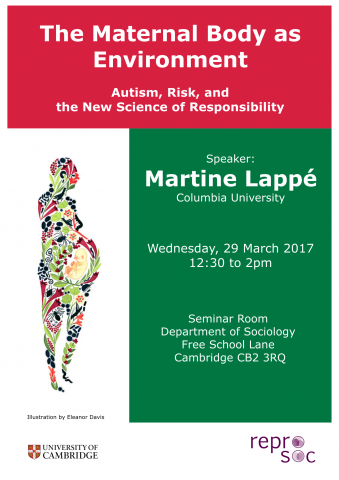 |
|
The Maternal Body as EnvironmentAutism, Risk, and the New Science of ResposibilityMartine Lappé29th March 2017
Research exploring the causes of autism spectrum disorder has increased significantly in recent years. This talk develops the concept of the maternal body as environment to describe how studies focused on environmental risk factors are producing women's bodies as sites of growing consequence for understanding childhood difference today. I argue that this science reflects new spatial and temporal dimensions of parental responsibility, and new ideas about the relationships between bodies and environments in the post-genomic era. |
|
|
|
|
|
|
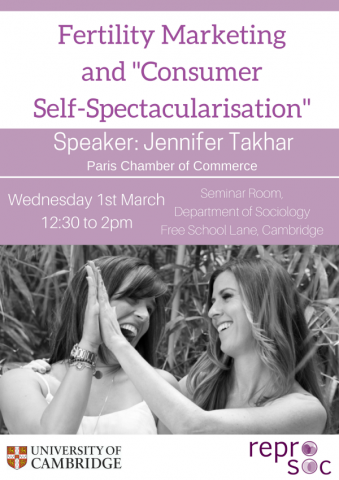 |
|
Fertility Marketing and "Consumer Self-Spectacularisation"Jennifer Takhar1st March 2017
The fourth-wave feminist movement has been celebrated as a revival of feminism that is driven by the power of the Internet and social media to challenge gender inequity. Through a rhetorical deconstruction of customer online testimonials from three American fertility websites I challenge the liberatory claims attached to fourth-wave expression. What emerges through this investigation is the user-generated complicity of consumers who are encouraged to buy into an infertility cure but who also inadvertently compound gendered perceptions of reproductive health. |
|
|
|
|
|
|
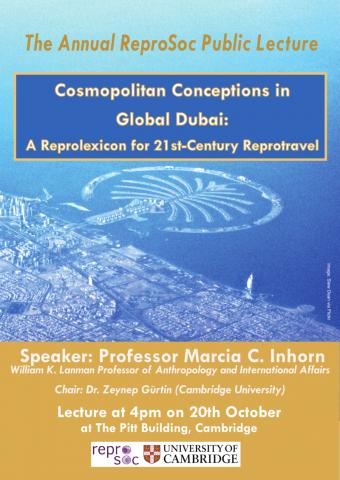 |
|
The Second Annual ReproSoc Public LectureCosmopolitan Conceptions in Global DubaiA Reprolexicon for 21st Century ReprotravelProfessor Marcia Inhorn20th October 2016Watch the Video
We are honoured to have Professor Marcia Inhorn delivering our second ReproSoc annual lecture. In her lecture, Marcia Inhorn, one of the world's leading medical anthropologists, explores the global market in fertility services drawing on her many years of fieldwork in Dubai -- now a major hub of assisted reproductive technology (ART). By exploring the demanding and complex journeys of 220 'reprotravellers' from 50 countries to Dubai's 'cosmopolitan' fertility centres, Inhorn argues we underestimate the costs of these often disappointing fertility odysseys, leading her to call for new forms of activism to address unmet reproductive health needs. |
|
|
|
|
|
|
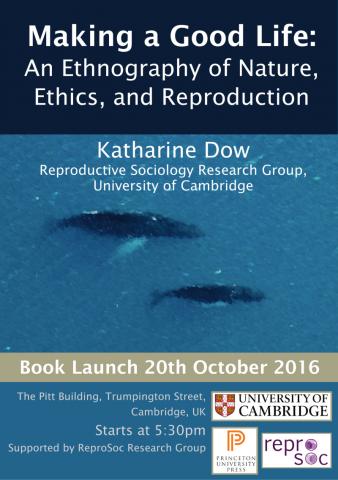 |
|
Making a Good Life Book LaunchAn Ethnography of Nature, Ethics, and Reproductionby Katie Dow20th October 2016
Making a Good Life takes a timely look at the ideas and values that inform how people think about reproduction and assisted reproductive technologies. In an era of heightened scrutiny about parenting and reproduction, fears about environmental degradation, and the rise of the biotechnology industry, Katharine Dow delves into the reproductive ethics of those who do not have a personal stake in assisted reproductive technologies, but who are building lives inspired and influenced by environmentalism and concerns about the natural world's future. Moving away from experiences of infertility treatments tied to the clinic and laboratory, Dow instead explores reproduction and assisted reproductive technologies as topics of public concern and debate, and she examines how people living in a coastal village in rural Scotland make ethical decisions and judgments about these matters. In particular, Dow engages with people's ideas about nature and naturalness, and how these relate to views about parenting and building stable environments for future generations. Taking into account the ways daily responsibilities and commitments are balanced with moral values, Dow suggests there is still much to uncover about reproductive ethics. Analyzing how ideas about reproduction intersect with wider ethical struggles, Making a Good Life offers a new approach to researching, thinking, and writing about nature, ethics, and reproduction. |
|
|
|
|
|
|
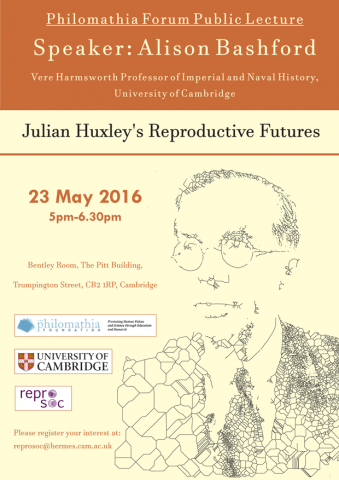 |
|
Julian Huxley's Reproductive FuturesAlison Bashford23rd May 2016Watch the Video
If the futures of assisted reproductive technologies are being created now, our own present was created by past generations. This is both strange and sobering, given how swiftly ideas, technologies, needs and desires change. Retrospects as well as prospects are important. In this lecture I consider the reproductive futures envisioned by one of the twentieth-century’s most intriguing polymath-biologists, Julian Huxley. Author of Evolution: the Modern Synthesis, inventor of the term ‘transhumanism’, first Director-General of UNESCO, Huxley synthesised and communicated the work of the great geneticists, molecular biologists and reproductive physiologists of the day. Many of them (Crick, Pincus, Lederberg, Muller) met at a conference in 1963, “Man and his Future”. This lecture focuses on this meeting, one that opened with Huxley’s visions for the “biological future of mankind”. In 1963, the future hinged on assisted reproductive technologies as a solution, but not on infertility as a problem. Alison Bashford is Vere Harmsworth Professor of Imperial and Naval History, and Fellow of Jesus College, Cambridge. Most recently, she is author of Global Population: History, Geopolitics and Life on Earth (Columbia, 2014) and co-author, with Joyce E. Chaplin, of The New Worlds of Thomas Robert Malthus: Re-reading the Principle of Population (Princeton, 2016). |
|
|
|
|
|
|
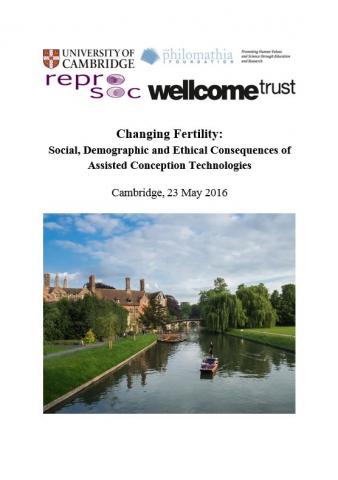 |
|
Changing Fertility: Social, Demographic and Ethical Consequences of Assisted Conception Technologies23rd May 2016Read the Programme
So far, less attention has been given to the significance of ARTs in relation to theories of fertility change, birth rate decline, or other forms of what are known as ‘demographic transition theory’. At the same time, we know that in every country where IVF and other ARTs have been developed, the consequences for reproduction have been complex and multifaceted. The effort, then, to ‘situate fertility’ more precisely in relation to the impact of ARTs represents a crucial, but largely unexplored, area of study. These issues are directly linked to policy implications regarding the level of spending on ARTs and the question of whether demographic or fertility implications should play a part in how these technologies are monitored, provided, or regulated. This forum addressed these questions by bringing together scholars from various disciplines, leading figures in the ART sector, and policy makers from the UK and abroad. |
|
|
|
|
|
|
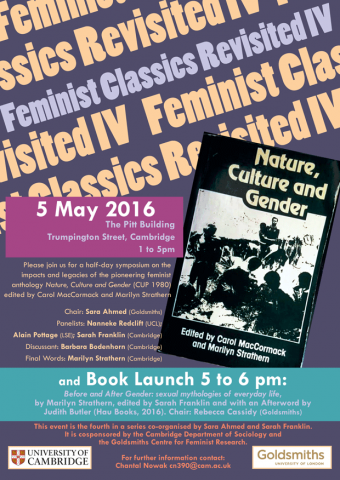 |
|
Feminist Classics Revisited IV&Book Launch for Before and After Gender by Marilyn Strathern5th May 2016Watch the Video
The fourth in this series co-organised by Cambridge and Goldsmiths will focus on Nature, Culture and Gender (1980) edited by Marilyn Strathern and Carole MacCormack. Sara Ahmed will chair the panel with Alain Pottage, Nanneke Redclift, Sarah Franklin, and discussant Barbara Bodenhorn who will be joined by Marilyn Strathern. Followed by the launch of Marilyn Strathern’s 1974 book Before and After Gender: sexual mythologies in everyday life, which was never published after it was written but has since been edited for release by Hau Books. Edited by Sarah Franklin with an Afterword by Judith Butler, this book will be launched at this special event chaired by Rebecca Cassidy. |
|
|
|
|
|
|
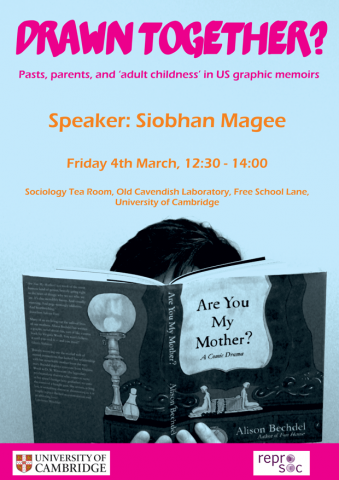 |
|
Drawn Together?Pasts, parents, and 'adult childness' in US graphic memoirs4th March 2016By visiting speaker Siobhan Magee This talk analyses a popular and culturally impactful strand of graphic novels: the graphic memoir. The affinity between the respective works of Alison Bechdel (Fun House: A Family Tragicomic; Are You My Mother?), Roz Chast (Can’t We Talk About Something More Pleasant?), and Art Spiegelman (Maus) and contemporary thought on gender, reproduction, and kinship is clear. Graphic memoirs provide detailed and by definition subjective accounts of relationships that take nothing about relatedness (biological or otherwise) for granted. Focusing on parent-child relationships (which are, amongst many other things, an idiom that we use to talk about social change) graphic memoirs tell of the ways in which relationships are informed by critical legal, scientific, and political events. These include progress in LGBTQ and women’s rights and the enduring ethical loadedness of reproducing both histories and lines of descent after the Holocaust. These demonstrate how technological advancements from the development of new reproductive technologies to research on age-related dementia inform intergenerational relationships. In this talk, I suggest that a key theme amongst graphic memoirs is ‘adult childness’. This describes the state of possessing a nagging awareness of ill-defined sets of obligations to one’s parents regarding gender, class, and (sometimes) faith-based social reproduction on the one hand and care, contact, and (sometimes) the ‘provision’ of grandchildren on the other. Academic and mainstream media discourses increasingly frame parenthood as a verb, something one does: ‘parenting’ (see Lee, Bristow, Faircloth, and Macvarish 2014). In contrast, I argue, the adult who reflects on their role ‘as offspring’ is less in a state of ‘-ing’ than inhabiting a state of being: a ‘-ness’. When being an ‘adult child’ means thinking about both one’s parents’ biographies and the socio-political context in which one was born and came of age, experiences of reproduction are just as much about conceptualizing pasts as they are about planning futures. |
|
|
|
|
|
|
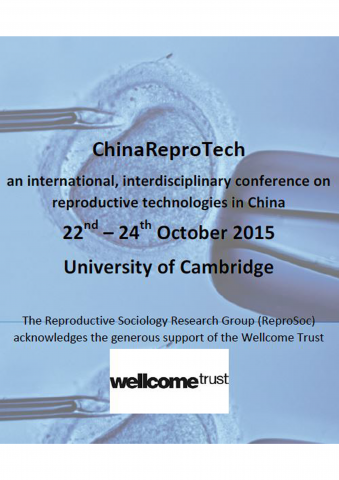 |
|
ChinaReproTech22-24th October 2015Read the Conference Report
In recent years the development and use of assisted reproductive technologies have exploded in China. Since China's first IVF baby was born in 1988, over 350 treatment centres have opened, potentially offering services to the over 90 million estimated infertile individuals in the country today. In addition to IVF, prenatal screening and genetic testing have also increased. This increase in reproductive technologies corresponds with a rise in popular concern about the impact of China's rapid social and environmental change on the nation's reproductive health. Such scientific action and medical attention takes place as the nation struggles to strengthen the quality of the Chinese population while managing population quantity after decades of explicitly eugenic governmental policies. Our international, interdisciplinary conference, China Repro Tech, offers historical, sociological, and anthropological perspective on these issues. Held at University of Cambridge, the conference is programmed to reflect the topical specializations of our participants - from the implications of IVF and infertility to the medicalization of gendered bodies and population policies. Our goals include, sharing research, methodologies, and discussion on the socio-cultural, economic, political and historical landscapes shaping reproduction in China today. Organised by Dr. Janelle Lamoreaux |
|
|
|
|
|
|
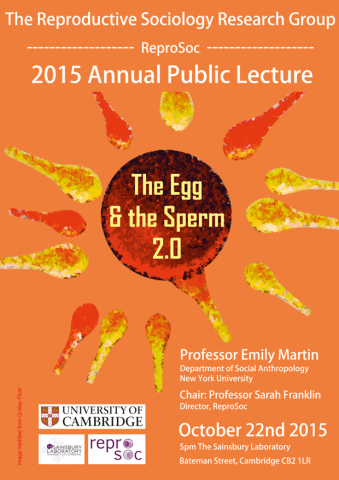 |
|
The Egg & The Sperm 2.0 - Emily Martin22nd October 2015Watch Video Here
The language and imagery of many biological sciences carries with it cultural assumptions about gender. In this illustrated lecture, I examine how reproductive biology and popular culture portray the saga of the sperm as it moves through the female reproductive tract and meets the egg. Some of these cultural assumptions make popular and technical accounts of biological processes misleading about research findings in biology itself. Have feminist accounts that are critical of the cultural overlay on biological language made a difference in the last 20 years? Have the increasing commodification of reproductive processes or the increasing variety of lived sexualities made a difference in the popular and scientific portrayal of the egg and the sperm? |
|
|
|
|
|
|
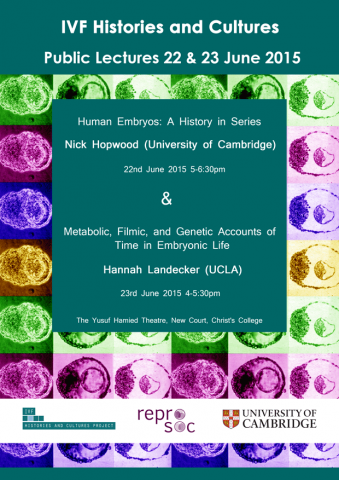 |
|
IVF Histories and Cultures Public Lectures22nd-23rd June 2015
Human Embryos: A History in Series 22nd June 2015 Nick Hopwood (University of Cambridge)
Metabolic, Filmic, and Genetic Accounts of Time in Embryonic Life 23rd June 2015 Hannah Landecker (UCLA) |
|
|
|
|
|
|
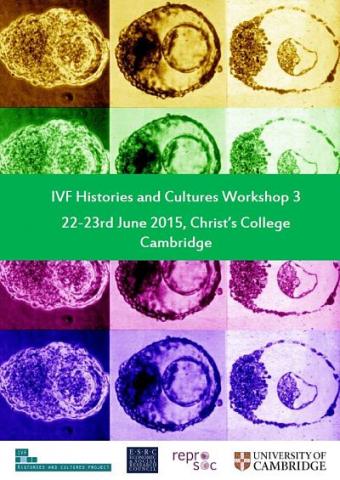 |
|
IVF Histories and Cultures Seminar 322-23rd June 2015Read the Programme
In this, our third ESRC-funded workshop, we considered the question of embryonic development as a visual and serial sequence, with particular reference to the recent introduction of time lapse imagery into clinical IVF. Described as one of the most significant technological improvements to modern IVF, time lapse imagery is also a technique that has a long history in the context of basic experimental science. In this workshop, we looked both forward and back at images of embryonic development and their key importance to IVF histories and cultures. Among the changing temporalities we considered are both those of embryological development and technological change. These are brought together in the context of IVF with implications this workshop will explore from an interdisciplinary vantage point. |
|
|
|
|
|
|
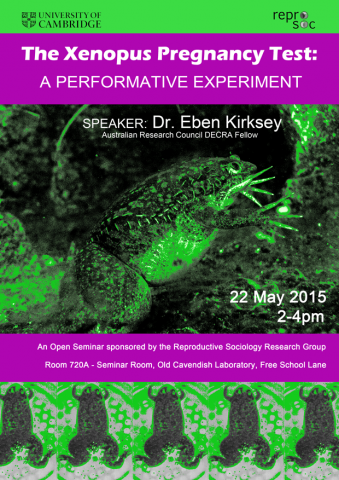 |
|
The Xenopus Pregnancy Test: A Performative Experiment - Dr. Eben Kirksey22nd May 2015Watch the Video
Performative experiments exhibit standard scientific protocols and modes of knowledge production for critical inspection. Drawing on “the performative turn” in science and technology studies, as well as queer theories of gender performance, these experiments often exaggerate, parody, and critique the norms of conventional science. We conducted a performative experiment, a pregnancy test, using a live Xenopus lavevis frog and urine from one of our own bodies. Human Chorionic Gonadotropin, if present in urine, causes Xenopus frogs to lay eggs, signaling pregnancy. By staging this anachronistic pregnancy test, which we retrieved from the annals of medical science, we investigated modes of choreographing human ontologies and expanded the tool kit of ethnography with novel methods and tactics. There is an appreciable gap between the biochemical condition of “being pregnant” and the social condition of experiencing oneself and being recognized by others as pregnant—a gap that technology can serve to narrow or widen depending on how one chooses to stage an ontological state. A positive pregnancy test at a very early stage with a pee-stick or blood test often presages an early miscarriage. Performing the Xenopus Pregnancy Test requires waiting for human bodies to enter a more stable ontology. Dr. Eben Kirksey, Ph.D. is an Australian Research Council DECRA Fellow, 2014-2017, a permanent faculty member in Environmental Humanities at UNSW Australia and visiting research scholar at Science Studies, The Graduate Center, City University of New York. He is the editor of The Multispecies Salon (Duke 2014). |
|
|
|
|
|
|
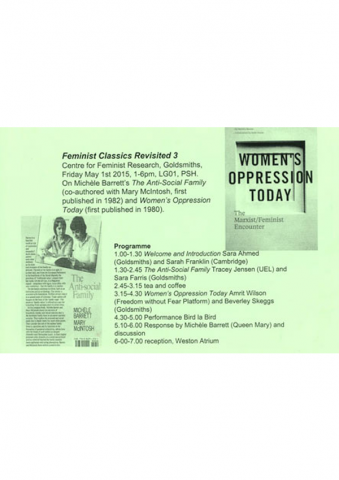 |
|
Feminist Classics Revisited 31st May 2015
Co-sponsored by The Centre for Feminist Research and ReproSoc
Michele Barrett's The Anti-Social Family (co-authored with Mary McIntosh) & Women's Oppression Today |
|
|
|
|
|
|
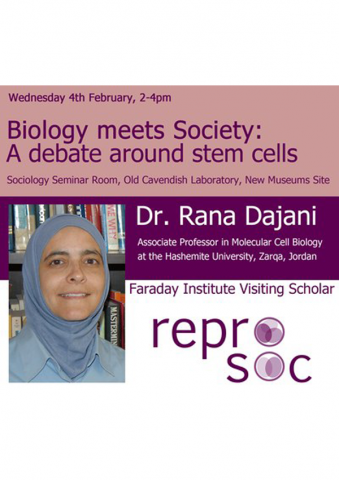 |
|
Biology meets Society: A debate around stem cells4th February 2015
In her talk, Dr. Dajani will discuss recent efforts to develop a legal regulatory framework for stem cells in Jordan and address the ethics of human embryonic stem cells in research and therapy. Considering insights for similar controversial issues, the talk also explores the natural scientist’s role in observing society and human practices in order to develop innovative and cutting edge hypotheses to benefit both the social and the natural sciences.
|
|
|
|
|
|
|
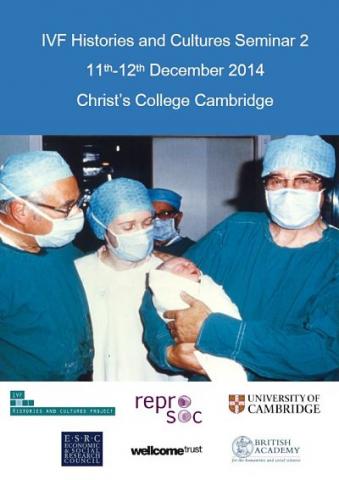 |
|
IVF Histories and Cultures Seminar 211-12th December 2014Read the ProgrammeIn this second workshop we are focused in more depth on two key periods and two key sites in the development of IVF: the period from the mid-1960s to 1978 when IVF was developed at Oldham, and the early 1980s when Edwards and Steptoe moved to Bourn Hall. We were extremely fortunate so many of whom were active in these periods, and at these sites, were able join us, and we heard reflections, memories and thoughts about these times and places, which have had a lasting effect not only in terms of modern IVF technology but how we think about reproduction and fertility. |
|
|
|
|
|
|
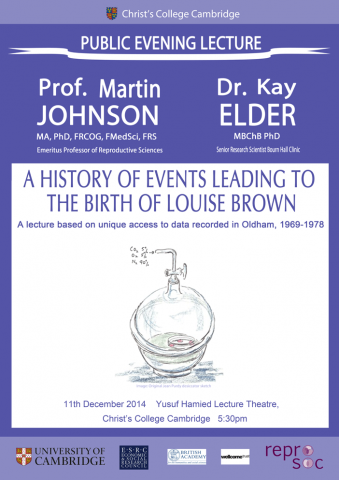 |
|
IVF Histories and Cultures Workshop11th December 2014Read the Blog Post
A History of Events Leading to the Birth of Louise Brown Speakers: Prof. Martin Johnson (Cambridge University) and Dr. Kay Elder (Bourne Hall Clinic) Between 1969 and 1978, Robert Edwards, Patrick Steptoe and Jean Purdy worked in Oldham and Cambridge to try to translate their successful IVF into a live birth.This was eventually achieved in July 1978 and January 1979 with the birth of the world's first two so-called 'test tube babies'. Recent access to the archive of the late Robert Edwards has enabled a clear history of the approaches used in solving the many problems encountered to be determined. This lecture will describe the clinical, scientific and ethical problems that the three researchers encountered over this nine and a half year period, and how they went about resolving them.
|
|
|
|
|
|
|
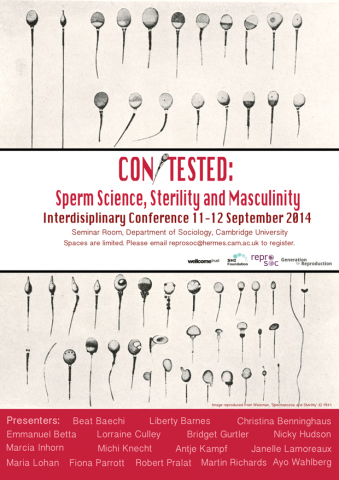 |
|
Con/Tested: Sperm Science, Sterility and Masculinity, Nineteenth Century to Present11-12th September 2014Read the Conference Report
Interdisciplinary Workshop 11-12 September 2014 Organised by Liberty Walther Barnes and Christina Benninghaus (image reproduced from Weisman, 'Spermatozoa and Sterility') |
|
|
|
|
|
|
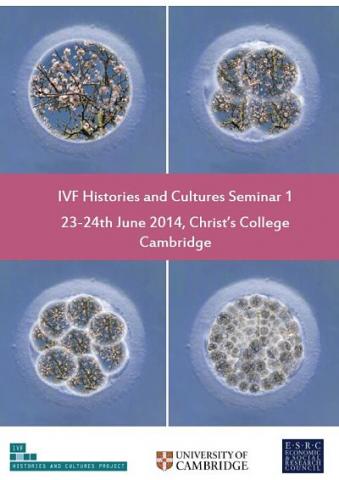 |
|
IVF Histories and Cultures Seminar 123-24th June 2014Read the Programme
The Inaugural Workshop of the IVF Histories and Cultures Project was the outcome of several intersecting projects over many years. This workshop was the outcome of several intersecting projects over many years, and its design reflected an ongoing desire to leave room for different strands of the study of IVF cultures and histories to overlap and diverge. Encouraging interdisciplinary dialogue is one thing: developing and sustaining it successfully over time is another. By starting from disparate perspectives, and bringing with us diverse forms of expertise -- but by limiting our field to a select range of images and questions -- our aim was exploratory and experimental, collaborative and inquisitive. Using conversation and dialogue as our experimental equipment, we exchanged perspectives and share demonstrations that revealed new questions. |
|
|
|
|
|
|
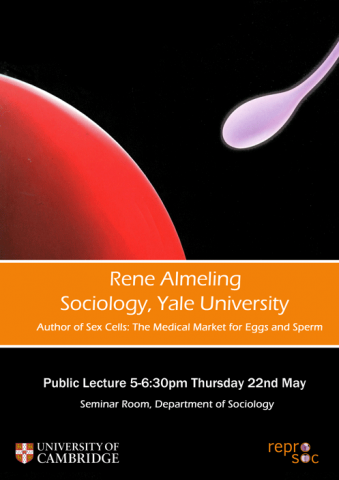 |
|
Sex Cells: The Medical Market for Eggs and Sperm22nd May 2014
Unimaginable until the twentieth century, the clinical practice of transferring eggs and sperm from body to body is now the basis of a bustling market in the United States. In this talk, Rene Almeling provides an inside look at how egg agencies and sperm banks do business. Although both men and women are usually drawn to donation for financial reasons, Almeling discusses how clinics encourage sperm donors to think of the payments as remuneration for an easy "job." Women receive more money but are urged to regard egg donation in feminine terms, as the ultimate "gift" from one woman to another. She argues that the gendered framing of paid donation, as either a job or a gift, not only influences the structure of the market for sex cells, but also profoundly affects the individuals whose genetic material is being purchased. Rene Almeling is an assistant professor of sociology at Yale University. She is author of the award-winning book, Sex Cells: The Medical Market for Eggs and Sperm (University of California Press, 2011). Her current research includes a national survey of American attitudes toward genetic risk, a survey of women's experiences with in vitro fertilization, an article for the Annual Review of Sociology on reproduction, and a new book project on the history of men's health. Her research on reproductive technologies, genetic testing, gender, and medicine has been featured in national and international media, including The New York Times and the BBC. |
|
|
|
|
|
|
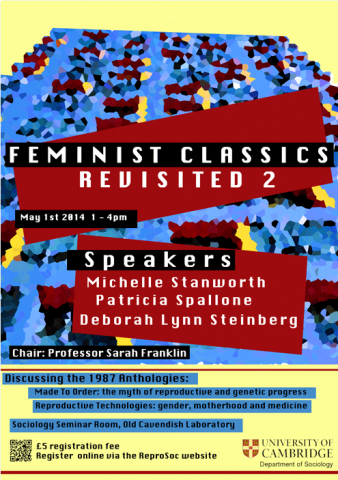 |
|
Feminist Classics Revisited 21st May 2014
Following last year's sold-out launch of this series focused on the work of Professor Ann Oakley, the Department of Sociology and the Reproductive Sociology Research Group (ReproSoc) are pleased to confirm that this year's symposium on 1 May 2014 from 1 to 4pm will be focused on two of the most influential feminist anthologies addressing reproductive technology to be published in the 1980s. Made to Order: the myth of reproductive and genetic progress, edited by Patricia Spallone and Deborah Lynn Steinberg, and Reproductive Technologies: gender, motherhood and medicine, edited by Michelle Stanworth, were both published in the UK in 1987. All three editors of these key texts will join us at our second FCR symposium to discuss a variety of themes, including the challenges of combining activism and publishing, the insights of early feminist analysis of NRTs, the struggle to define a feminist politics in relation to this issue, and some of the key feminist activist groups that emerged in the 1980s. Make sure to reserve a place on the Feminist Classics Revisited online registration site. |
|
|
|
|||
|
|
Countering Homophobia through Research and Film14th October 2013
The Centre for Family Research and ReproSoc are pleased to invite you to a seminar and film screening on the 14th October with Dr Nanette Gartrell & Dr Dee Mosbacher at The Howard Theatre, Downing College, 5 - 7pm. Nanette Gartrell, MD, is a visiting Distinguished Scholar at the Williams Institute, UCLA School of Law, U.S., and has a guest appointment at the University of Amsterdam. Dr Gartrell has been following 78 planned lesbian families since the children were conceived through donor insemination in the mid-1980s. In this seminar, she will discuss data collected from the mothers and their 17-year-old adolescent offspring concerning the adolescents' psychological adjustment, quality of life, substance use, risk exposure, sexual behavior, sexual orientation, and experiences of stigmatization. Dr. Gartrell will also discuss the influence of donor status (permanently anonymous versus as-yet-unknown and known donors) and male role models on the psychological well-being of the adolescents. Dee Mosbacher, MD, PhD is a psychiatrist and an Academy Award nominated filmmaker. She is president of Woman Vision, which promotes social change through media. Dr Mosbacher will present 'Straight from the Heart', an Academy Award nominated short documentary that portrays five parents' journeys toward understanding their adult lesbian and gay children. Straight from the Heart presents stories about real people: a police chief who talks about how proud he is of his lesbian daughter, a Mormon couple whose son is believed to be the first gay man in Idaho to have died from AIDS, and a black woman and her two lesbian daughters who had been accused of "catching" their lesbianism from white people. After the film, Dr Mosbacher will discuss the use of her films on homophobia to start a dialogue about homosexuality in conservative communities. |


